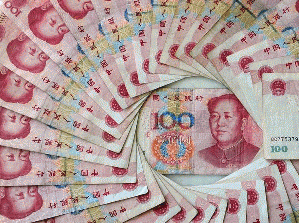Reprinted from Campaign For America's Future
"What is good for growth in China is unfortunately bad for everybody else." -- Bill McQuaker, co-head of the multi-asset team at Henderson Global Investors, quoted in Reuters
China on Monday announced it is lowering the value of its currency about 2 percent in order to boost its economic growth by supporting its exporters. Traders are betting that the currency will fall further. Markets around the world are reacting negatively. What does this mean?
Bloomberg Business has the currency story, in China Rattles Markets With Yuan Devaluation,
"China devalued the yuan in a move that rippled through global markets, as policy makers stepped up efforts to support exporters and boost the role of market pricing in Asia's largest economy."
CNBC.com reported earlier this morning that U.S. stocks were set to take a double-digit tumble for the second consecutive day "after China moved to devalue its currency for a second day in a row."
China has used currency manipulation as a form of subsidy for exports to cause things made there to cost less in world markets than things made elsewhere. China exports more and more; other countries are forced to import more and more. The resulting imbalance has thrown the world's economy out of whack, including causing massive job losses in the U.S.
China's currency had appreciated somewhat, until 2014. But it has been kept from reaching "market rates." And, pegged closely to the dollar, it was rising against other competitors as the dollar rose, making China less competitive with them. After 2014 it began to drop again, as China tried to push its own economy. Now, there was a huge 2 percent drop in a day.
The New York Times Upshot, in "Why Did China Devalue Its Currency? Two Big Reasons," writes:
"The renminbi on Monday was at about the same exchange rate versus the dollar that it was in mid-December. But in that span, the dollar index was up 8.7 percent, meaning the dollar -- and by extension the renminbi -- were up that much against the currencies of other advanced nations like the euro, the Japanese yen and the British pound.
"Linking the value of its currency to the dollar has had benefits, but in the last year has come at a big cost: It has resulted in the renminbi's rise against competitors and trading partners at a time the economic fundamentals of China would argue for it to fall."
Market Rates?
Until now China closely controlled the value of its currency, only allowing it to move a fraction each day. They had said they would allow movement in a "band" of 2 percent, but this had not happened. Suddenly this week they allowed it, and said they would continue to allow it. Traders are betting this will happen -- that the currency is actually overvalued because China's economy is slowing. But until there is an actual open market there is no real way to know.
If China is going to really allow the currency to float to market rates, it could continue to move dramatically up or down until traders believe it is where it should be. This will roil markets and pricing, but after some time things will settle.
China Slowdown Fears, Capital Flight
The Bloomberg report also echoes fears that this big move by China reflects that their economy might be in worse shape than reported, always a concern:
(Note: You can view every article as one long page if you sign up as an Advocate Member, or higher).





